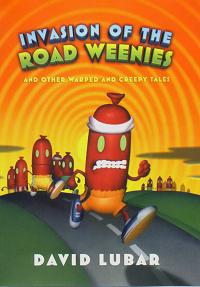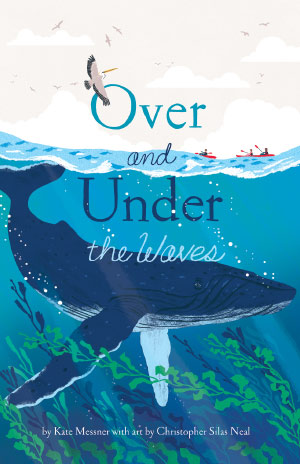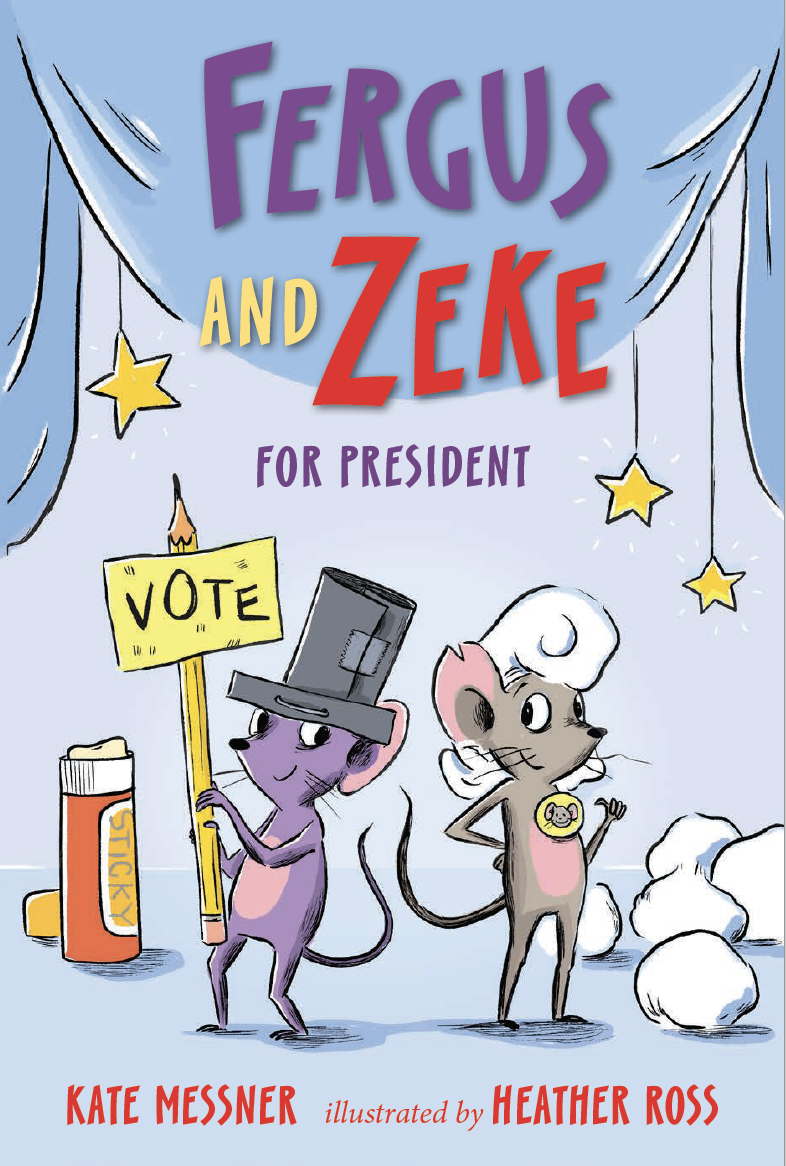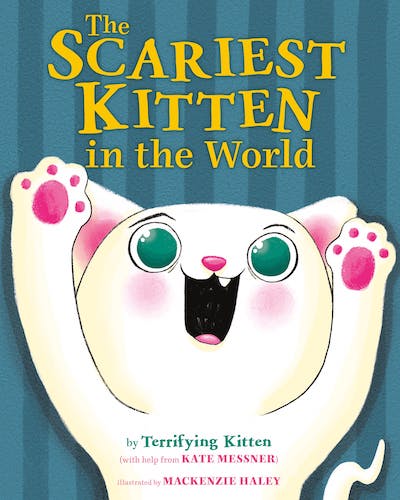Good morning! Ready to start a new week? Visit Jo for your Monday Morning Warm-Up, and then come back here. Today, we’re going to talk about mistakes. 🙂
So far, we’ve been doing a lot of free writing here at Teachers Write summer camp, but eventually, we’ll all want to dive into revisions on one project or another.
Guest author David Lubar joins us for today’s Mini-Lesson Monday, “Fixing the Inevitable Mistakes.” David is an author and game designer. He’s published about twenty books for kids and young adults, including HIDDEN TALENTS and the Weenies short story collections, which are super-popular with reluctant readers.


Fixing the Inevitable Mistakes
During school visits, I often tell students that whether I’m writing a book or programming a video game, I spend 90% of my time fixing my mistakes. Granted, the percentage is slightly lower for writing than programming, and writing mistakes have never caused a book to hang or crash, but it’s a basic truth of anything I do that I will make mistaks. We all make mistakes.
Some are specific to ourselves. In the heat of the first draft, I’ll often write “it’s” for “its,” though I know the difference. I use “a couple of” far too often. I’m sure you have your own pet mistakes. But then there are those mistakes we all make, the inevitable ones. I’d been planning to discuss several of them. That’s why I proposed the title, “Fixing the Inevitable Mistakes.” But as I started drafting this, I discovered that I’d made a pair of my own typical specific mistakes – getting over ambitions and forgetting my inherent laziness. (I also didn’t quite absorb the significance of the “mini” portion of the task. So, in brief (though it already appears too late for that to be true, highlighting another specific mistake in that I tend to get wordy and ramble off topic), we’ll look at just one inevitable mistake. But it’s a perfect one for this mini lesson.
First, consider the following excerpt from an early draft of my novel, Dunk. To put it in context, one character has just loaned some video tapes (yeah, it’s an old excerpt) to another character, to help him prepare for a performance that is several weeks away.
“Let me know when you’re done with those. I’ve got plenty more.” He walked out, closing the door behind him. “Remember, we’ve only got three weeks.”
See if you can spot the large problem with this scene. Find it? Basically, one character has continued talking after he closed the door. Unless it was a screen door, that just doesn’t work. Why did I make this mistake? Because I had an afterthought. Our brains don’t work in linear fashion. We think about things, build on them, expand our ideas, and discover ways to flesh ideas out. We write, for the most part, linearly. I might possibly have stopped and inserted the extra dialogue where it belonged, but in the heat of creation, I never even noticed that the last line of dialogue was out of sequence. I suspect the mistake survived at least one or two revision passes. (I’m an alumnus of the many-quick-passes school of haphazard revision.) Eventually, I spotted the mistake.
Here’s the thing. We all have afterthoughts. And they occur at nearly every level of writing. (I’m pretty sure my subconscious is constantly working on many aspects of my current work in progress.) Afterthoughts are inevitable. We add words to sentences. I walked out of the room quickly. The “quickly” occurred to me at the end. It could be moved. But, in this case, it would be better to replace the whole phrase. We add sentences to paragraphs, as we saw in the first example. We add paragraphs to chapters. And we add chapters to novels. (It’s even possible to add novels to series as an afterthought, but let’s not take things quite that far, today.) Just to show what a hot mess of unsequenced garbage a professional writer can spew in a first draft, here’s a paragraph that wanders all over the place:
Once the car left the parking lot, the girls started talking about college. Teri and Mom were planning a trip in a couple weeks to look at schools in PA and upstate NY. Our high school let juniors take four days off to check out colleges. Jennifer was a senior. She’d already narrowed her choices down to Bloomsburg or Pitt. Lana mentioned her plans. So did Vanessa.
And here’s how it looks after the various afterthoughts were reunited with their co-workers.
Once the car left the parking lot, the girls started talking about college. Jennifer was a senior. She’d already narrowed her choices down to Bloomsburg or Pitt. Lana mentioned her plans. So did Vanessa. Teri and Mom were planning a trip in a couple weeks to look at schools in PA and upstate NY. Our high school let juniors take four days off to check out colleges.
It was only after writing the part about the school policy that I realized I should tell the plans of all the characters. But the fix was easy enough. The task is rarely difficult. Mostly, it’s just a matter of cutting and pasting. Sometimes, things need to be tweaked after they’re moved. And an afterthought might partially repeat previous information, so you might have to trim things a bit. The trick is to pay attention to what you wrote – not what you THOUGHT you wrote. Much of revision boils down to seeing what is actually on the page. And one of the ways to see what went wrong is to be aware of specific mistakes, such as leaving afterthoughts where they fall, as opposed to finding them their proper forever home. Like unintentional word repetition, or breaks in viewpoint, afterthoughts become much more visible when you put them on your mental checklist.
Note from Kate: I had mixed feelings about running a piece about revision so early in the summer, but so many of you have shared your worries about your quick-write and first drafts (“It’s crummy!” “Everyone else is better at this!”) that I thought it would be good to see an author’s messy process and relax, knowing that all of our early drafts are rough ones.
There’s no need to get revising just yet, but I thought for today’s writing assignment, we could all do a short piece that I sometimes used with my middle school students as they were evaluating pieces, getting ready to revise.
Choose a piece of writing that you’ve done – something that’s not super-polished – maybe a draft of your work-in-progress or one of the Teachers Write prompts you did earlier this month, and answer this question:
If your writing could talk back to you, what would it say about its own strengths and weaknesses?
(My current work in progress had a little talk with me this morning. “My dear Kate,” it said, “I am so fat with your meticulously researched details of 1850s Maryland that I am simply moving too slowly under the weight of all these historical riches. When you revise, you’ll need to put me on a bit of a diet, keeping the best and getting rid of the rest. Also, you forgot about weather. I need rain, some wind, and at least one decent thunderstorm. Everything will look different in the lightning at night.”
If you’d like to share your writing today, feel free to leave a paragraph or two in the comments!





If my writing could talk back to me, I think it would pat me on the head and say, “Now how is any of this important to your plot?” I was relieved to get some fresh writing in yesterday, but today I’ve been re-reading and revising, so this post was timely. I’m not that worried about my odd placement of random words that look like I’m starting a sentence only to be abandoned after one word. I’m confident that I can polish the heck out of that kind of thing, and that a fresh pair of eyes will spot what starts to look normal. I’m much more worried about the over arching plot line. Should I even have a chapter on the boarding school that my hero won’t attend? I’m trying to give him motivation to work to stay at his current school… but maybe it’s unnecessary? This is back to the line someone posted and I’m remembering without the author: The first draft is perfect because all it has to do is exist. (A chocolate to the first person who tells me who said that.)
Here’s a snippet of what I wrote yesterday. Lola and Pogo are both dogs being fostered. Owen and Christopher are helping at the shelter. Owen is supposed to do an agility demo. Hopefully the rest makes sense?
_____________
“I thought we’d find a good family for Lola. I never thought she’d leave so quickly that she couldn’t be your agility dog.”
“Her name is actually Napa Valley’s Sophia Lauren.” Owen tallied how many attempts it had taken before Pogo had finally gone through the tunnel.
“What kind of a name is that? Stupid.” Christopher picked up a rock and chucked at the grass. Pogo took off after it.
“I believe it’s a pedigree name. She was the AKC National Champion.” Owen ran his finger down the list of obstacles Pogo needed to learn. The tunnel was scaring him, but now that he’d been rewarded for going through, Owen was confident Pogo would pick it up quickly. The A-frame worried him. With only three legs, Pogo would be at a serious disadvantage coming down the ramp.
“They don’t deserve a dog.” Christopher muttered. “I bet they never even played with her.” Pogo wandered back and head butted Owen.
Owen looked up, puzzled. “Why are you mad at them? It wasn’t their fault that someone stole Napa Valley’s Sophia Lauren.”
“I’m never calling her that. She’ll always be Lola to me.” Christopher chucked another rock and Pogo took off again.
Wonderful dialog! And, I love the name Napa Valley’s Sophia Loren. LOL. It’s funny. Adults will get it. And, I like the problem(s) in the story…Christopher’s frustration and Pogo’s missing limb. This is a wonderful set up for a story.
Cynthia Lord is the author of the comment “Your first draft is perfect because it exists!”
Terry, I really connected with what you said about your writing, since plot is something I am struggling with too. I don’t worry about wording or phrasing because I know I will fix it later, but I want the story to be compelling. I never am sure if the decisions I make about the plot are the right ones for the story.
I liked your piece about dog agility — there is a dog in my story too, modeled after one of my mom’s dogs who is an agility class failure.
Oh, Terry, you and me both. My draft would be saying “this is all well and good, but can we cut the flashbacks and backstory that are bogging down the actual story?
I love the piece you included.You managed to set up a lot through the dialogue in a very natural way–mixed feelings, frustration, Pogo’s challenges. It definitely made me want to read more.
It’s so good to have David Lubar back this year! What a great article.
If my writing could talk back to me, it would ask me why I use such awkward phrasing and complicated words. It would also wonder why I misspell words and use poor grammar, when I’m such a member of the grammar police! Luckily for me my editorial side is (mostly) able to find those errors when I revise. However, sometimes I need to enlist my daughter’s help. My MC in my WIP is a little older than her, but the story if for my daughter’s age group, so I had her read it for authenticity. Here’s one paragraph she helped me with:
BEFORE:
Lilly struggled out of sleep and opened her eyes to gray light filtering through the thread-bare curtains. She blinked a few times and then stretched wakefulness into her body. She hear the rustle of her mother’s skirts behind the petition, and the clink of dishes, but no smells of cooking wafted to her like they normally did.
AFTER:
Lily opened her eyes to gray light filtering through the threadbare curtains. She blinked a few times and then stretched. She heard the rustle of her mother’s skirts behind the partition, and the clink of dishes, but no smells of cooking wafted in to her like they normally did.
Very nice. I understand the struggle with complicated wording. I LIKE my complicated wording….I find it comfortable and descriptive….but readers find it…awkward. Thanks for the great example of how you edited. I had to carefully read word for word because I didn’t pick up on the differences right away. I am off to see what my writing says to me. Never, ever thought of my drafts in this way before.
Wendy — I love your revision example. There’s so much going on. I hope, even though you deleted it, that you’re keeping “stretched wakefulness” on in mind for use down the road. It’s such a great phrase. Thanks for not deleting the kind words about my article. 🙂
David,
I am keeping everything. I never know when I’ll use it!
Wendy, I liked both examples – they show a different style. I think maybe it depends on how you want your book to “sound” when you read it.
It’s nice to have a reader of the age group for your novel to help with wording!
I had the most wonderful experience this past week at a literacy institute that included teachers, professors, authors, coaches….and then I came home to discover that a friend of mine is gaining certification as an executive coach…and needed to practice on someone with a project! woo hoo! I happily had my first session with my coach yesterday and she helped me formulate a plan for writing a book (which is different than PUBLISHING a book. lol). I feel most fortunate because the coaching really helped me think through some things.
But I digress.
The snippets below are re-writes from a quick write this morning. They are labeled 2 and 3.
I think if my writing were to talk to me it would tell me to stop explaining and teaching so much and to just be in the moment. I think you will see what I mean in the snippets below.
****2****
August
Registration
I go with Mami to the school office
she is very, very quiet…the kind of quiet I know not to fool around in.
my immunization record from the clinic and an envelope with our address on it to show where we live.
Tia Resa told her Not to be scared
The list of documents we needed to find is so simple.
So impossible but we have found them.
A treasure hunt each day with help from Tio Luis.
When we walk in it is dark and cool.
I smell interesting smells—coffee, paper, floor wax and belonging.
I am afraid to belong here and afraid not to.
In this country you can get into trouble for not going to school.
To me it looks like no one is home until we turn a corner and see an office bright with lights
ladies are busy talking on the phone, writing, talking to each other.
The ladies are bright too.
Mami is so nervous there is sweat on her neck. She pushes through the doors
The woman with the shining eyes says Bueno and Mami melts a little but remembers to stand straight and asks where to turn in the documents for school.
********3********
***3***
August Registration
I go school with Mami
in the kind of quiet I know not to fool around in.
The documents she carries is impossible
but we have found them.
A treasure hunt each day with help from Tio Luis:
immunization record from the clinic
an envelope with our address
certificate of foreign birth
A photograph of my head showing right ear.
Tia Resa told Mami not to be scared.
In this country you can get into trouble
for not going to school.
We walk into the dark and cool
brick building.
I smell coffee, paper, floor wax and belonging.
I am afraid to be here.
afraid not to.
To me it looks like no one is home until we
see an office bright with lights and
ladies talking on phones, writing and laughing.
Mami is so nervous there is sweat on her neck
when she pushes through the doors.
The woman at the closest desk
says Bueno.
Mami melts a little, remembers to
stand straight and asks
where to turn in the documents for school.
I think the formatting is all off….not sure how to easily fix that on the blog.
Thanks for sharing, Linda. I’m a fan of conciseness — especially in poetry. So, I like how, in the revision, you “omit needless words” (as my old friends Strunk and White advised in _Elements of Style_). That really tightens up version #3, its shorter lines quickening the pace. I also love this bit: “the kind of quiet I know not to fool around in.”
I love what you said about “being in the moment”. I wish I could get to that place more often when I’m writing.
Linda –
You have a piece I’d be boggled down by trying to edit, but I love how you revised it. It feels subtle, yet cleaner and simpler and sweeter. Your revision 3 gets the essence of v2 without so much clutter. Like how I never know what to move off the counter, but if I take off everything and just put back what we use, it is so much more restful even to look at.
Okay. I’m pretty sure that’s a cluttered up compliment, but I’m trying to say that it draws me in more directly. Thanks for providing a good example of revision for style!
Asking my writing to talk back felt a little like opening Pandora’s box. Suddenly, I found myself under interrogation:
So, where am I going anyway? I’ve got a triangle of characters, each an intriguing vertex… but now what? A few kind readers at Teachers Write have questions about me, and somewhere you’ve got answers. I’m not just another piece you’re going to abandon, am I? Why not elaborate on me… spin out a plot diagram or see if a little research finds my magnetic north? You like research, right? It’s a fun rabbit hole. Or what the heck, forget research for now; just keep drafting! Remember, Anne Lamott’s one-inch frame? What’s the next square inch of me you can see?
p.s. To whomever mentioned that this comment box can be re-sized: thanks! I’m filing that pointer under ‘little things mean a lot’ 🙂
Brian, I can relate to your point about the “now what”? I sometimes feel like there’s too many threads in my story to organize (and then, at the same time, it feels like there isn’t enough “story”…how does that happen?) You’re right, we need to just keep drafting and see where it takes us!
I also appreciated the tip about resizing the comment box! Thank you to the original poster who mentioned that.
I appreciate your writing asking if it was just going to be abandoned. Poor little thing. I agree. Draft now. Revise and add in research later. Words for all of us.
(We really ought to track down the post that explained how to resize. It’s changed my life. Or at least decreased my confusion immensely.)
If my writing talked to me it would most definitely ask me why I deserted it. Why did you get to a major question or problem and then just stop? Why haven’t you done what you usually do and talk the scene out with your husband.
When I come to a point where I a stuck my husband usually sits with me and talks me through several scenarios. The funny thing is deep inside I usually know what I need to do, but it takes his suggestions to trigger that buried thought. Until I find time to do that I abandon my work. This exercise made me realize that and what I need to do to fix it.
The right trigger (or person) can make all the difference.
Hi Kate and David,
Thank you for today’s post for Teachers Write. I took a piece from last year and made some changes-editing and revising. I am not sure if I found inevitable mistakes but I sure made some changes. Here is the link to my post if you’re interested in seeing it. http://theamyrudder.blogspot.com/2014/07/revised-frog.html
I set it up in Word to track all the changes as I sort of “went through with the red pen”. I was fun to try and make it better. Thanks for the inspiration.
Amy Rudd
Hi Kate and David,
Thank you for today’s post for Teachers Write. I took a piece from last year and made some changes-editing and revising. I am not sure if I found inevitable mistakes but I sure made some changes. Here is the link to my post if you’re interested in seeing it. http://theamyrudder.blogspot.com/2014/07/revised-frog.html
I set it up in Word to track all the changes as I sort of “went through with the red pen”. I was fun to try and make it better. Thanks for the inspiration.
Amy Rudd
If my writing could talk back to me, I think it would tell me to just go with it. Write it down, just to put your thoughts on paper, then go back and revise. I want to add more adjectives and description, but this is where I am so far. So many of you are such talented novel writers and I wish I was one of them. I am more comfortable with poems or short, mentor texts. Well, here it goes.
I Wanna Pet Llama!
Dear mom and dad,
I’ve finally decided.
On the pet that I want,
Love and care, I’ll provide it.
The pet that I want,
It’s different than most,
It’s original, it’s true,
But I hate to boast.
The pet that I want,
Grazes on grass like a bull.
It’s related to camels,
And you can use their wool.
Have you guessed, have you guessed,
The pet that I need?
I wanna pet… (turn page)
LLama, a pet llama indeed!
Love,
Mikey
Dear Mikey,
A pet llama is out of the question our son,
We understand that you
Really want one.
Think about another more practical pet,
One that you can convince us to get.
Love,
Mom and Dad
Dear Mom and Dad,
Okay, a llama is out of the question, I see,
The animal I want, lives in a tree.
It likes eucalyptus,
And gets moisture from leaves.
It sleeps a long time,
Up to 18 hours a day,
I will care for it and love it,
And yes, we will play!
Do you know, do you know,
What animal we can share?
The animal is a… (turn page)
koala bear!
Love your deserving son,
Mikey
Dear Mikey,
A koala bear is cute,
It is true.
But a koala bear’s a marsupial
That belongs in a zoo.
Not a house like ours,
It’s too tiny you see.
Plus… we don’t have a Eucalyptus tree.
Love,
Your realistic parents
Really enjoyed this, Michelle! I loved the flow of it, Mikey’s persuasive reasoning and his parent’s in-kind replies. Fun and fresh!
I loved reading this! Thank you so much for sharing these works-I know several of my kids would love to read either of these works.
Michlel,
I totally enjoyed these poems, and the innocence and drive of Mikey, trying to convince his parents to get either pet for him. Wonderful!
Hooray! Poetry! And, it’s for kids…love it. I can see a whole series of these leading to the pet that is acceptable. Yes, keep going. Keep writing. These are totally fun.
If my writing could talk to me, it would ask me why it is that I can find so many other things to do besides documenting the lives and adventures of the characters in its stories…how can I leave them all hanging, their lives incomplete, their problems unresolved? It’s tough being chastised by fictional folks so early on a Monday morning! 🙂
If my writing could talk to me, it would say:
Please get working on finishing my story! You can move things around later to make it more coherent. I’m only a first draft and once I’m finished we can work on improvements. Even if you only write a little bit today, that’s a little bit more that you didn’t have yesterday. What about a half hour of writing? Everyone has a half hour to spare.
Dear Kim (my writing knows me well enough to use my nickname),
Your current WIP is only about the bad things that happened in your life. Perhaps you had to get those off your chest in order to think coherently, but you’ve had a very nice life also. Find the good things and write about them. This piece needs to be more balanced.
Hi Kim:
I find myself doing the same thing. Recently, I read that writing is therapeutic for everyone. Maybe in order to reflect on the good, you need to write about the bad first. I don’t feel there is anything wrong with that. I can’t wait to see what positive things you reflect on. Happy writing!
Michele
I think that my writing would plead with me not to second-guess everything that I write and instead be willing to go with the flow and clean up any messes later, once I have my rough ideas down on paper. Since I’m working a lot with professional writing, I find myself stopping and asking myself if anyone would really want to listen to me. I think my writing, then, would also strongly suggest that I turn off that inner voice that is such a “Negative Nellie” and to trust my instincts and also to trust my message.
Hi Jennifer:
The teacher in me also finds it difficult to not want to fix my mistakes and revise as I go. This only makes my writing dull. Good for you for realizing that a rough draft SHOULD have mistakes, a plenty of them. I don’t think you would be human if you weren’t worried about the “Negative Nelly” inside of your head. Unfortunately, there are always critics, however, luckily, there are many more positive people out there who truly deserve and desire to hear what you have to write about. Good luck to you and know you are not alone.
Michele
Terry said – I’m not just another piece you’re going to abandon, am I?
This is what my writing would say to me too! I havent’ been able to stick to one piece. The prompts keep leading me in different directions. That’s okay it is a summer of exploration and I’m having a ball with it! I will look at what I’ve done for camp and let each piece speak to me in case they have additional comments.
After reviewing a few of the TW pieces, I hear my WIP urging me to “plunge”.
Plunge further into the story, and encounter characters you have yet to meet. They are a necessary part of developing the theme.
Plunge deeper into the backstory of each of the family members. Listen to their insecurities, their desperate needs, and their muted cries for connection. Your novel, is their story.
Plunge with abandon. Plunge freely. Plunge into dark corners and small crevices, exploring and experimenting with rhythms and melodies your voice is unaccustomed to, trusting that as the story grows in scope substance, you will also.
can’t wait to see where that takes you!
It sounds like you need to write short stories for each character – stories that won\’t show up in the final manuscript, but just for you.
If my writing could talk to me it would say, “Why don’t you ever finish anything?” I am a procrastinator. I am also a school librarian and I really enjoy reading everything that everyone else has written. I forget that I have things to finish, too. Therefore, I have a bunch of things that are in progress. This summer writing workshop has been wonderful because the prompts are always there when I get up in the morning. I’m hoping that I will continue to write early in the morning once the demands of the school year begin to take hold. Perhaps one day I can answer myself by saying, “See, I can finish something.”
Lucretia,
I am in the same boat as you. I am a school librarian, and summers are usually the time I get caught up on reading. Well, I’m doing that, but also working on my MG novel. I also have a hard time finishing anything. But I’m determined to have a draft of my novel done by the end of the year.
Great Goal! This process is also making me realize it’s time to finish something. Best of luck to you!
Today’s challenge about reflecting on mistakes was a great exercise for me in my writing! Here’s my blog post reflections: http://pollyannawriter.wordpress.com/2014/07/22/teacherswrite-day-9-making-mistakes/. Thanks for all the support and suggestions! I am enjoying this group immensely!
Great writing advice and great comments. All very cool .
You’re quite welcome, Amy. That’s a clever idea, using track changes.
Thank you, David for sharing your thoughts and suggestions. If my writing were to talk to me, I believe it would say, “OK, super, excellent idea. Now you need to expand. You need to make it better. Take this draft and move forward. Write, write, write and then write some more. ~Suzy Leopold
Thanks for the posts this morning. I’m writing to meet a deadline, and the draft is really horrible. It’s always good to hear that other people feel the same way. I will take a moment tomorrow to rewrite a section using David’s suggestions.
Kate, your letter made me laugh 🙂 Thanks! I need to remember this is supposed to be fun!